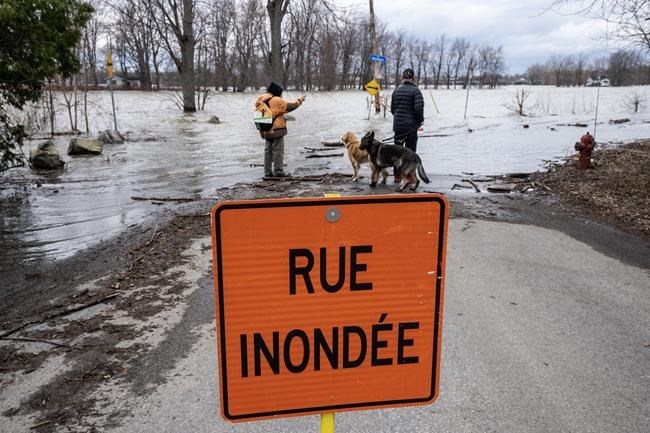MONTREAL — A town near Quebec City declared a state of local emergency and other communities ordered preventive evacuations on Tuesday as torrential rain caused rivers across southern Quebec to burst free of their banks.
By Tuesday, between 500 and 600 people were forced from their homes in Ste-Brigitte-de-Laval, where the mayor declared a state of emergency for the next 48 hours.
Marc Proulx, the town's general director, said about 250 homes were "flooded or near-flooded" after the Montmorency River rose rapidly and inundated roads and communities. He said some roads were also flooded, making it impossible for workers to check the extent of the damage.
He warned that government data suggested the river would continue rising until the end of the day. "After that, we're going to reach the highest point, and after that, the situation is going to turn on the good side," he said.
A spokesman for the Public Security Department said the storms caused damage mainly along a broad corridor that includes Estrie, Centre-du-Québec, Mauricie, Quebec City, Charlevoix and Chaudière-Appalaches.
"Paths that have been obstructed, damaged roads, culverts that have given way, these are the kinds of consequences we see," Joshua Ménard-Suarez said Tuesday.
Late in the afternoon the province's flood monitoring website showed minor flooding at 10 monitoring stations, including several in the Estrie region east of Montreal.
Officials in Sherbrooke, 150 kilometres east of Montreal, announced they had ordered preventive evacuations for nearly 300 people living in 144 residences in neighbourhoods close to the St-François River and warned that the number could rise.
Fire Chief Stéphane Simoneau said the river level rose to 21 feet from eight feet in less than four hours. "It's an extraordinary quantity of water," Simoneau told a news conference. However, he said the flooding had not yet reached any homes.
Évelyne Beaudin, the city's mayor, said this amount of flooding in the middle of summer is "unprecedented." Both she and Proulx blamed the situation on climate change, which they said was causing weather patterns to become more unpredictable.
"Today we’re finding ourselves in a situation where there are floods in the middle of July, so for sure it makes us question how we manage emergency situations," Beaudin said.
Cookshire-Eaton, just east of Sherbrooke, also announced it was evacuating several streets near the Eaton River, which spilled its banks overnight. Eastman, to the west of Sherbrooke, said it was asking some residents to evacuate, adding that some roads had become risky or impassable.
The rising waters also had an impact on the Quebec City region, where roads were closed and a small number of people were asked to leave their homes as a precaution.
About 20 residences were ordered to evacuate in the provincial capital, while Stoneham-et-Tewksbury to the north asked people in one section to leave in part because road access could be cut off.
Environment Canada said the amount of rainfall in the heaviest-hit regions, when combined with precipitation from previous days, could trigger flash floods, landslides and water accumulation on roads.
Ménard-Suarez suggested people should warn municipal officials about signs that could signal a landslide, such as unusual cracks or bulges on sloping ground or unusual water flows.
"It's insidious, because it's hard to know where it can manifest itself, when, and how big it can get," he said.
Environment Canada warned that severe thunderstorms were possible for the Laurentians and Lanaudière regions north of Montreal and said the conditions were right for heavy winds and hail.
The Lac-Saint-Jean region could receive between 50 and 70 millimetres of rain by the end of the day and Côte-Nord region could get around 50, the federal department said.
This report by The Canadian Press was first published July 11, 2023.
— With files from Stéphane Blais and Jean-Philippe Denoncourt
Morgan Lowrie, The Canadian Press



